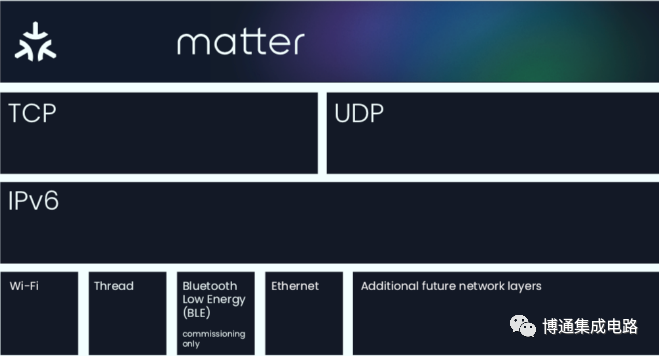2022-11-26
Recently, Beken Corporation (603068.SH) has become one of the first companies in the world to receive Matter certification from the Connectivity Standards Alliance (CSA) for its BK7231 and BK7235 series chips. These chips have also been certified by the Wi-Fi Alliance, making Beken Corporation one of the first companies globally to hold dual certifications for both Matter and Wi-Fi Alliance standards. With comprehensive technological expertise and a rich product portfolio, Beken Corporation will continue to collaborate with partners to advance the construction of the IoT ecosystem, fully empowering the new era of AIoT.
Overview of the Matter Protocol
With the advent of the era of interconnected everything, global giants such as Apple, Google, Samsung, and Amazon, as well as domestic brands like Xiaomi and Alibaba, have all entered the fray, establishing their own smart ecosystems. However, the lack of a unified connection standard among different platforms has long been a challenge for the development of the AIoT industry. Consumers who purchase smart home products from different brands often find it difficult to achieve cross-brand interoperability. Additionally, they need to download and install different apps to operate devices from different brands, which negatively impacts the user experience and poses challenges for the integrated development of the smart connectivity market. Therefore, both the industry and consumers need a universal standard that can break down the barriers between different brand ecosystems and address the issue of interoperability.
With the introduction of the Matter protocol, this predicament is expected to be resolved.
The Matter protocol, released by the Connectivity Standards Alliance (formerly the Zigbee Alliance), is a new global standard for IP-based IoT. Its goal is to "break down barriers between platforms". As an application layer protocol developed to address the interoperability of smart home devices, the Matter protocol establishes a complete and unified standard for connecting compatible devices and systems. With the support of the Matter protocol, whether users are fans of Apple Home, Google Home, Amazon Alexa, or Samsung SmartThings, they can eliminate connection barriers when using smart devices. The introduction of the Matter protocol is a milestone for the development of the IoT industry.

Features of the Matter Protocol
As a global open protocol, the development of the Matter 1.0 standard involved complex processes such as protocol compatibility, device model definition, and device interoperability adaptation. These require the participation of multiple links in the industry chain, from chips to systems and to end devices. Therefore, on one hand, it needs to accommodate the existing ecosystems and characteristics of major smart home platforms such as Amazon, Google, and Apple. On the other hand, it has to address the security challenges brought by higher openness and meet the requirements for backward compatibility with previously deployed IoT devices.
To meet these application requirements, the Matter protocol adopted a "General Application Layer + Data Model" approach, compatible with multiple network layer transmission protocols, making configuration and control simpler. Additionally, by using the 128-bit AES-CBC AES-128-CCM encryption algorithm in its architecture, the protocol ensures the authenticity of devices connected to the home network, guaranteeing network connection security.
Furthermore, the Matter protocol has low resource requirements, needing only MCU-level computing power, no more than 128KB of RAM, and no more than 1MB of Flash memory space. This enables smart home products to enter the market with a more cost-effective advantage, providing users with simpler, better-performing, more reliable, and safer smart life services.


Application Scope of the Matter Protocol
The initial version of the Matter protocol supports Ethernet, Wi-Fi, low-energy Bluetooth, and Thread devices. Devices can join the Matter network via Bluetooth, form a star network via Wi-Fi (or a mesh network via Thread) for interconnection, and can also connect to devices using other protocols via bridges. The initial version of the Matter protocol supports various common smart home product categories, including lighting, electrical appliances, curtains, air conditioning, sensors, door locks, video players, protocol bridges, and control terminals embedded in various types of products.
After the release of the Matter 1.0 standard and certification process, users will be provided with more complete and convenient smart application scenarios, as well as stronger privacy and security services. At the same time, the Matter protocol will further promote development iterations, not only adding more new features and device types but also continuously improving technical specifications, SDKs, and testing capabilities. As the Matter standard evolves, its applications will not be limited to smart homes. In the future, it can be combined with sensor technology, artificial intelligence, and edge computing, potentially being applied to wireless communication fields such as automotive and industrial scenarios.

Beken Corporation's Series of Chips First to Pass Matter 1.0 Certification
Beken Corporation (603068.SH) is one of the earliest chip design companies in China to layout in the AIoT field. Leveraging its advantages in technology, experience, and ecosystem, the company actively responds to and promotes the development, design, testing, and verification of the Matter protocol, facilitating the rapid global adoption of the Matter protocol.
Following the launch of the first Wi-Fi 6 chip for IoT applications in early 2021, the company's BK7231 and BK7235 chips have recently become the first to pass Matter certification from the CSA Alliance, making Beken Corporation one of the first companies globally to receive Matter certification. Additionally, these products have also received Wi-Fi Alliance certification, making Beken Corporation one of the first companies globally to hold dual certifications for both Matter and Wi-Fi Alliance standards.
Moreover, the company's series of products supports Amazon MSS, enabling secure and quick integration into the Amazon Alexa ecosystem. These products have also received PSA certification, indicating that the chip's information security protection capabilities have reached internationally leading levels.
Relying on the company's product and technical advantages, the company's BK7231 chip has entered the supply chain systems of customers. Meanwhile, the BK7235 chip can be widely used in scenarios such as video doorbells, smart locks, and central control panels. The company's series of products features multi-device access, high anti-interference capability, longer communication distance, and lower power consumption, enabling them to play a significant role in various IoT fields, including the smart home appliance market, the UAV and model aircraft market, module market, and electrical market.
With the development of the Internet of Things industry, 5G + AICDE (AI, IoT, Cloud, Data, Edge) will further unleash the vast application space of industrial internet. The Matter protocol, as a bridge between various device systems, will significantly enhance user experience, product development for R&D personnel, and commercial operations and sales, thereby further accelerating the rapid development of the AIoT market. With its rich portfolio of high-performance products, Beken Corporation will assist in the full-scenario implementation of the Matter protocol and its application in terminal devices, enabling the mass and multifunctionalization of edge computing nodes in terminals such as automotive, home appliances, wearables, and audio-visual devices, jointly ushering in a new era of AIoT industry development.